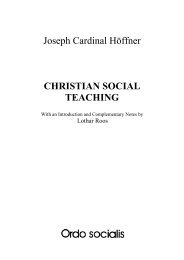Prof. Franz Josef Stegmann Bethlehem Social ... - Ordo Socialis
Prof. Franz Josef Stegmann Bethlehem Social ... - Ordo Socialis
Prof. Franz Josef Stegmann Bethlehem Social ... - Ordo Socialis
Create successful ePaper yourself
Turn your PDF publications into a flip-book with our unique Google optimized e-Paper software.
<strong>Stegmann</strong><br />
Uneconomic utilisation of limited economic resources and the squandering of the economic<br />
potential violates human solidarity or - in Christian words - breaks the commandment to love<br />
one's neighbour. Because of that, the moral quality and value of a market economy lie<br />
primarily in its ability to use scarce and limited economic resources to the optimum.<br />
On the other hand, the state ought only to exert as much authority and pressure as is<br />
absolutely necessary, and ought to give as much freedom as possible to individuals. Christian<br />
<strong>Social</strong> Teaching more precisely: the commandment of subsidiarity, which is one of its basic<br />
principles - demands that individuals themselves be active agents and subjects in the<br />
economic field. The subsidiarity principle claims "that one should not withdraw from<br />
individuals and commit to the community what they can accomplish by their own enterprise<br />
and industry”. This would he "an injustice and a grave evil", 69 stresses the Encyclical<br />
Quadragesimo Anno of 1931, which formulated the principle for the first time. Subsidiarity<br />
therefore holds that those things which can be done or decided by individuals or at a lower<br />
level of society, should not be taken over by a higher level. It demands (I repeat) that<br />
individuals themselves he active agents in the economic field - ie, that they have the<br />
opportunity to take the economic initiative.<br />
They are not simply parts or functionaries of an economic collective, whether this is called<br />
people's democracy, the state or anything else. Regarding this point, neoliberalism and<br />
Catholic <strong>Social</strong> Teaching "are in complete agreement". 70<br />
3.2.2 The understanding of freedom and the priority of the economy in neoliberalism needs to<br />
be criticised<br />
To a great extent, the neoliberal concept of freedom is just a formal one. The scope of decision<br />
and action of the individual should be limited as little as possible. The understanding of<br />
freedom which is oriented to the human being and his/her dignity demands, however, that free<br />
decisions must be aligned to one's responsibility for one's neighbour and - being a Christian -<br />
to one's responsibility to God.<br />
A second question refers to the role of economic freedom. Without doubt, economic freedom<br />
takes "a legitimate place in the systems of values". But economic freedom is "neither the only<br />
nor the highest value"; it rather stands among other values such as social justice, common<br />
good and solidarity. Sometimes freedom "might even take second place to them". 71<br />
Another objection, connected to the previous one, refers to the neoliberal over-emphasis on<br />
the economy. In neoliberal theory and especially in neoliberal practice, the economy de facto<br />
is often seen and treated as equivalent to the "market forces", the market mechanism, ruled by<br />
competition. For Christian <strong>Social</strong> Teaching the economy is a part of comprehensive societal<br />
transactions, and economic actions have important social implications. The quality of an<br />
economy is therefore to he measured by the extent to which it contributes to the creation of<br />
human conditions of life for all. An abundance of economic goods and material wealth alone<br />
is not desirable if, for example, this wealth is unjustly distributed. The objective of the economy<br />
is not to produce an abundance of goods for some people - that is to say, for the rich - but<br />
69 Pius XI, Quadragesimo Anno (1931). No. 79<br />
70 Oswald von Nell‐Breuning, Neoliberalismus und katholische Soziallehre, in: Oswald von Nell‐Breuning,<br />
Wirtschaft und Gesellschaft heute, Vol. 3, Freiburg 1960, 81‐98, 82.<br />
71 Georg Bernhard Kripp, Wirtschaftsfreiheit und katholische Soziallehre, Zürich ‐ St' Gallen 1967, 171‐172.<br />
29















